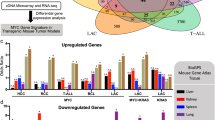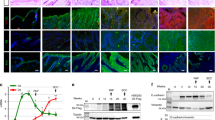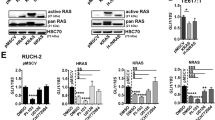Abstract
Hepatocyte Growth Factor (HGF) receptor, encoded by the protooncogene c-met, is overexpressed in many human tumours, including those of thyroid epithelium. The absence in most cases of any primary structural abnormality of the met gene suggests that overexpression is secondary to mutation of other gene(s). To test this hypothesis we investigated the effect on met expression of two activated oncogenes known to play a major role in thyroid oncogenesis, ras and ret. To minimize the possibility of unknown co-operating events, we introduced these genes directly into normal human thyrocytes in primary culture using amphotropic retroviral vectors and assessed met expression as early as possible in the resulting epithelial colonies. Double immunofluorescence revealed expression of met protein, strictly localized to cells expressing the mutant ras and ret vectors, expression in background normal cells being barely detectable. In contrast, colonies induced to proliferate at a comparable rate by a vector expressing SV40 T showed no increase in met expression. To permit quantitation by Western blotting we also extended these findings to a thyroid cell line (R18) containing a zinc-inducible mutant ras gene. Induction of the oncogene led to a fourfold increase in met protein expression. We conclude that overexpression of met is induced by activation of the ras or ret signalling pathway and not simply by deregulation of the cell cycle per se. The data suggest that the proliferative advantage conferred by these oncogenes may be in part due to the resulting sensitization of tumour epithelium to paracrine HGF secreted by stromal cells.
This is a preview of subscription content, access via your institution
Access options
Subscribe to this journal
Receive 50 print issues and online access
$259.00 per year
only $5.18 per issue
Buy this article
- Purchase on Springer Link
- Instant access to full article PDF
Prices may be subject to local taxes which are calculated during checkout
Similar content being viewed by others
Author information
Authors and Affiliations
Rights and permissions
About this article
Cite this article
Ivan, M., Bond, J., Prat, M. et al. Activated ras and ret oncogenes induce over-expression of c-met (hepatocyte growth factor receptor) in human thyroid epithelial cells. Oncogene 14, 2417–2423 (1997). https://doi.org/10.1038/sj.onc.1201083
Received:
Revised:
Accepted:
Issue Date:
DOI: https://doi.org/10.1038/sj.onc.1201083
Keywords
This article is cited by
-
Intraoperative MET-receptor targeted fluorescent imaging and spectroscopy for lymph node detection in papillary thyroid cancer: novel diagnostic tools for more selective central lymph node compartment dissection
European Journal of Nuclear Medicine and Molecular Imaging (2022)
-
MET targeting: time for a rematch
Oncogene (2020)
-
Medullary Thyroid Cancer: Clinical Characteristics and New Insights into Therapeutic Strategies Targeting Tyrosine Kinases
Molecular Diagnosis & Therapy (2017)
-
Preclinical and clinical evaluation of MET functions in cancer cells and in the tumor stroma
Oncogene (2016)
-
MET-targeted therapy for gastric cancer: the importance of a biomarker-based strategy
Gastric Cancer (2016)



